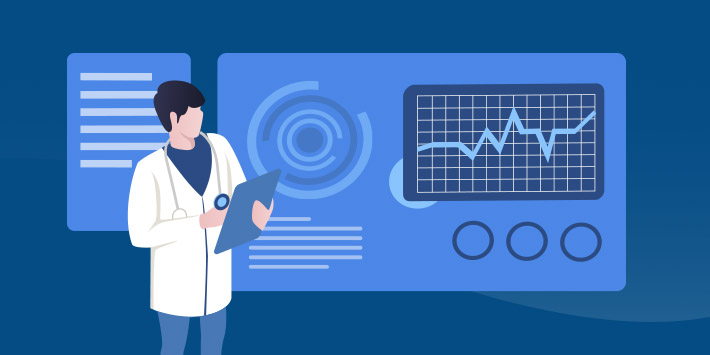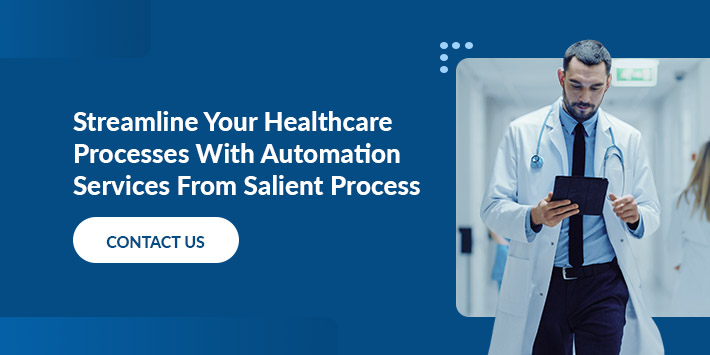
Clinician documentation and other administrative tasks can hinder patient care capabilities and lead to burnout. When healthcare professionals are burdened by inefficient workflows and manual, repetitive processes, it can directly affect patients’ experience, safety, and outcomes.
As a leader in healthcare operations, streamlining your organizational processes is key to helping your providers improve efficiency that benefits all stakeholders. Automated technologies can help your healthcare organization save money by eliminating unnecessary running resources and preventing disruptions in the workflow.
Automation in healthcare refers to emerging technologies that enable organizations to improve efficiency and reduce potential errors. Typically, healthcare facilities rely on human intervention for many critical tasks, including scheduling appointments, managing waitlists, conducting patient surveys, and facilitating revenue cycle management.
Automated solutions perform these types of actions automatically, limiting staff workload and streamlining the administrative, diagnostic, or laboratory processes. Though automation cannot replace experienced professionals for many essential tasks, certain time-consuming activities and outdated, high-effort approaches are worth considering for automation.
Today, artificial intelligence (AI) has become increasingly used in healthcare services to improve accuracy and efficiency and consolidate and process data. AI and automation in healthcare are helping organizations take a more innovative, comprehensive approach to care and transform clinical decision-making.
Automating your healthcare business can do more than optimize your operations. Here are some key advantages to enabling efficiency and transforming your organization with healthcare automation.
Scheduling appointments, sending out reminders, and resolving scheduling conflicts are time-consuming manual tasks. Automation can help healthcare staff manage appointments more efficiently, from matching patients to the correct provider to canceling appointments. Automated solutions enhance the patient experience by strengthening communication and offering convenience to patients, which can help reduce cancellations and no-show appointments.
Burnout and stress are two of the leading causes of healthcare staff turnover. Work overload and administrative burdens can also reduce the capacity to provide quality patient care. in fact, work overload can triple the risk of a healthcare professional’s burnout and intent to leave the profession.
Implementing automation can lighten the workload on your managers, providers, and staff. Automated solutions modernize your critical administrative tasks, including:
Teams that are free to be more productive during their shifts enable better healthcare quality and can lower overhead costs. Additionally, a reduced workload burden on staff may also facilitate lower stress levels, fewer errors, and reduced overtime, all while improving efficiency.
As a leader in the healthcare space, you know how critical it is to adhere to patient privacy laws, including HIPAA. These regulations are a requirement for all healthcare facilities to ensure the protection of patient health information. Using outdated, paper-based systems or relying on overburdened staff can increase your organization’s security risks.
Using compliant software can help ensure compliance by keeping data secure and automating case management. Automation compliance tools prevent unauthorized access to personally identifiable information, enhancing data privacy.
Human factors in healthcare errors can contribute to poor patient safety outcomes, including significant increases in morbidity and mortality. Burnt-out clinicians are particularly at risk for committing medical errors or unsafe practices. Additionally, many healthcare workers involved in an error may not report their mistake for fear of negative consequences.
Automation can reduce the risk of data entry errors and enable improved patient safety. From administrative operations to diagnosis to treatment, automated solutions can assist healthcare providers and managers in preventing future mistakes.

Automation has been driving advancements in healthcare in many areas, including patient data. From electronic health records to automated patient registration systems, technology has made data access and transfer much more manageable. Efficient data exchange is critical for improving patient care and health outcomes. Comprehensive patient data allows providers to coordinate care and improve operational efficiency.
Implementing automated solutions in your healthcare organization can help your teams exchange authorized information across departments, facilities, and devices. Faster data retrieval can also lighten the administrative burden and enhance the workflow when several institutions must work together for a patient’s treatment.
Running a healthcare facility requires effective management of several workflows, including patient wellness, coordinating staff, and case management. Managing these workflows manually can make it challenging to meet goals and address operational gaps.
Automating can help streamline critical management tasks that typically take up a significant amount of time for your providers and staff. Likewise, healthcare managers can improve response times during emergencies and when recruiting and hiring staff. Automation supports the ability to quickly adapt to fluctuations in patient volume, helping reduce bottlenecks in staff scheduling and operational workflows.
Inconsistent, fragmented communication can lead to slowdowns in everyday healthcare tasks. Outdated communication channels, policies, and procedures are partly to blame, hindering the ability of healthcare workers to coordinate efficient care. Automating workflows can boost collaboration and communication among managers, providers, and patients.
Online portals, automated messaging systems, and accessibility to healthcare records are just a few examples of how these solutions can simplify communication. Direct, personal, and consistent communication can help your healthcare business meet patient needs more effectively and promote adherence to compliance automation regulations.
All of the above benefits can foster an overall better patient experience at your healthcare organization. Automation technologies can greatly improve efficiency throughout all departments in your facility, allowing managers, providers, and staff to focus on building stronger patient relationships. Healthcare automation aims to boost satisfaction in many ways, including:
Moreover, automated care can foster improved patient-provider relationships by implementing timely, personalized interactions. With fewer mundane, repetitive administrative tasks, clinicians can spend more face-to-face time with patients and build a strong rapport. As a result, patients feel heard and trust their providers, making them more likely to follow treatment plans and improve health outcomes.
Now that you know how automation can fundamentally transform your healthcare organization, let’s review when and how you can utilize these solutions to improve productivity and efficiency:

It’s becoming increasingly clear how healthcare facilities can benefit from automation. Improving project management and operational processes with automated solutions means your providers have more time to focus on high-value tasks like patient care. Among the growing challenges in the healthcare industry, it’s important to rely on a partner like Salient Process for high-quality software.
From implementation to eliminating waste, we’ll support your teams to ensure accurate results and smooth processes. Our Digital Business Automation solutions will also contribute to helping you increase your productivity and boost your return on investment. Contact us today to learn more about automating your healthcare processes.